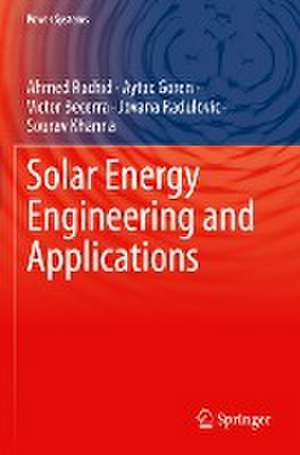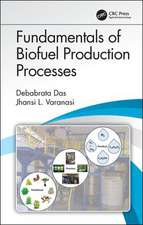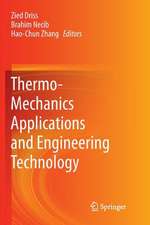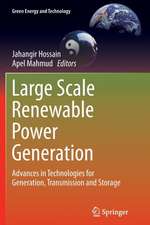Solar Energy Engineering and Applications: Power Systems
Autor Ahmed Rachid, Aytac Goren, Victor Becerra, Jovana Radulovic, Sourav Khannaen Limba Engleză Paperback – 16 feb 2024
| Toate formatele și edițiile | Preț | Express |
|---|---|---|
| Paperback (1) | 522.89 lei 6-8 săpt. | |
| Springer International Publishing – 16 feb 2024 | 522.89 lei 6-8 săpt. | |
| Hardback (1) | 698.47 lei 6-8 săpt. | |
| Springer International Publishing – 15 feb 2023 | 698.47 lei 6-8 săpt. |
Din seria Power Systems
- 18%
 Preț: 953.13 lei
Preț: 953.13 lei - 18%
 Preț: 783.98 lei
Preț: 783.98 lei - 20%
 Preț: 1002.47 lei
Preț: 1002.47 lei - 18%
 Preț: 1021.86 lei
Preț: 1021.86 lei - 18%
 Preț: 897.65 lei
Preț: 897.65 lei - 18%
 Preț: 788.72 lei
Preț: 788.72 lei - 18%
 Preț: 734.27 lei
Preț: 734.27 lei - 18%
 Preț: 902.36 lei
Preț: 902.36 lei -
 Preț: 563.49 lei
Preț: 563.49 lei - 18%
 Preț: 955.08 lei
Preț: 955.08 lei - 18%
 Preț: 946.87 lei
Preț: 946.87 lei - 18%
 Preț: 950.52 lei
Preț: 950.52 lei - 18%
 Preț: 949.23 lei
Preț: 949.23 lei - 15%
 Preț: 641.85 lei
Preț: 641.85 lei - 18%
 Preț: 1116.26 lei
Preț: 1116.26 lei - 18%
 Preț: 961.10 lei
Preț: 961.10 lei - 18%
 Preț: 1386.17 lei
Preț: 1386.17 lei - 15%
 Preț: 639.59 lei
Preț: 639.59 lei - 15%
 Preț: 641.03 lei
Preț: 641.03 lei - 18%
 Preț: 2497.51 lei
Preț: 2497.51 lei - 18%
 Preț: 957.62 lei
Preț: 957.62 lei - 18%
 Preț: 1229.91 lei
Preț: 1229.91 lei - 15%
 Preț: 643.34 lei
Preț: 643.34 lei - 18%
 Preț: 957.09 lei
Preț: 957.09 lei - 18%
 Preț: 1231.47 lei
Preț: 1231.47 lei - 15%
 Preț: 698.30 lei
Preț: 698.30 lei - 18%
 Preț: 953.20 lei
Preț: 953.20 lei - 15%
 Preț: 640.88 lei
Preț: 640.88 lei - 15%
 Preț: 634.18 lei
Preț: 634.18 lei - 18%
 Preț: 955.08 lei
Preț: 955.08 lei - 18%
 Preț: 1241.73 lei
Preț: 1241.73 lei - 18%
 Preț: 952.09 lei
Preț: 952.09 lei - 18%
 Preț: 946.55 lei
Preț: 946.55 lei - 18%
 Preț: 961.86 lei
Preț: 961.86 lei - 18%
 Preț: 944.19 lei
Preț: 944.19 lei - 18%
 Preț: 1110.72 lei
Preț: 1110.72 lei - 15%
 Preț: 642.03 lei
Preț: 642.03 lei - 15%
 Preț: 636.12 lei
Preț: 636.12 lei - 18%
 Preț: 1114.83 lei
Preț: 1114.83 lei - 15%
 Preț: 639.90 lei
Preț: 639.90 lei - 18%
 Preț: 957.32 lei
Preț: 957.32 lei - 18%
 Preț: 1235.57 lei
Preț: 1235.57 lei - 18%
 Preț: 959.19 lei
Preț: 959.19 lei
Preț: 522.89 lei
Preț vechi: 615.16 lei
-15% Nou
Puncte Express: 784
Preț estimativ în valută:
100.06€ • 103.84$ • 83.64£
100.06€ • 103.84$ • 83.64£
Carte tipărită la comandă
Livrare economică 17-31 martie
Preluare comenzi: 021 569.72.76
Specificații
ISBN-13: 9783031208324
ISBN-10: 3031208323
Pagini: 192
Ilustrații: IX, 192 p. 149 illus., 116 illus. in color.
Dimensiuni: 155 x 235 mm
Greutate: 0.29 kg
Ediția:1st ed. 2023
Editura: Springer International Publishing
Colecția Springer
Seria Power Systems
Locul publicării:Cham, Switzerland
ISBN-10: 3031208323
Pagini: 192
Ilustrații: IX, 192 p. 149 illus., 116 illus. in color.
Dimensiuni: 155 x 235 mm
Greutate: 0.29 kg
Ediția:1st ed. 2023
Editura: Springer International Publishing
Colecția Springer
Seria Power Systems
Locul publicării:Cham, Switzerland
Cuprins
Fundamentals of Solar Energy.- Photovoltaic Cells and Systems.- Battery Technologies.- Concentrators.- Solar PV/T Systems.- Smart Grids and Solar Energy.- Applications of Solar Energy.- Performance Assessment and Profitability.
Notă biografică
Ahmed Rachid, Ph.D., received his engineering degree in Cybernetics from École Polytechnique de l'Université de Lorraine (ESSTIN) in 1983, an MBA in 1985, his Ph.D. in electrical engineering in 1986, and the Habilitation degree in 1991 from the University of Nancy. He has been teaching since 1984, mainly in control engineering and signal processing. Since 1992, he has been a professor at the University of Picardie Jules Verne where he created the university’s first laboratory in automatic systems. His current research includes processes and systems modeling, simulation, control, diagnosis, and observation with applications to blast furnaces, vehicle dynamics, diesel engines, induction electrical drives, stepper motors, incubators, greenhouses, magnetic levitation, pantograph-catenary, HVAC, co-generation, and electric vehicles. He has supervised 24 Ph.D. theses and has co-authored two patents, two books, and more than 150 scientific papers. He has organized and chaired several international conferences and has coordinated various European research projects and industrial R&D contracts.
Sourav Khanna, Ph.D., received his degree in mathematics from Panjab University in 2007 and his MSc and Ph.D. in energy science and engineering from the Indian Institute of Technology (IIT) Bombay in 2010 and 2015, respectively. He is currently a lecturer in energy and thermal engineering at the School of Energy and Electronic Engineering, University of Portsmouth. From 2015 to 2019, he was a postdoctoral research fellow at the University of Exeter and the University of Portsmouth. His research interests include modeling solar photovoltaics, solar thermal energy systems, and hybrid renewable energy systems. He has published over 35 refereed journal articles and international conference papers. He is a member of the International Solar Energy Society. He has received external research funding from the UKIERI and is a guest editor forthe journal Energies.
Aytaç Gören, Ph.D., received his M.Sc. and Ph.D. in mechanical engineering in 2001 and 2007 from Dokuz Eylul University (DEU). During his M.Sc. and Ph.D. studies, he worked with the Solar Energy and Control Laboratories of FH-Rosenheim, Germany, and the Interchangeable Manufacturing and Industrial Metrology Laboratory of TU-Vienna as an invited researcher. He started teaching at DEU in 2001 and has been a guest professor with the Innovation Technologies Laboratory of Université de Picardie Jules Verne. His current research interests include solar cars, photovoltaics, electric vehicles, mobile robots, artificial neural networks, high efficient brushless DC motors (BLDCMs), brushless DC drives, and polymer matrix composites. He has published book chapters and over forty papers in reviewed journals and conferences. He participated as an organizing committee member, executive board member, or chair in several international and national conferences on electromobility, control, and modern manufacturing techniques. He founded and an R&D-oriented company for more than twelve years that designs and produces embedded control and sensor cards for heat recovery systems, micro maximum power point tracking (MPPT), linear BLDCMs, and air gauges. He has been involved in several research projects about industrial automation, robotics, solar cars, and polymer composites which were supported by the EU, The Scientific and Technological Research Council of Turkey, and the Ministry of Science, Industry, and Technology of Turkey. Dr. Gören is the founder and has been leading the Solaris Solar Car Projects since 2004. His project groups designed and produced seven solar cars and five electric vehicles, which participated in World Solar Challenges, Turkish Solar Challenges, European Solar Challenges, France Solar Challenge, Italian Solar Challenge and Moroccan Solar Challenges.
Victor Becerra, Ph.D., received his degree in electrical engineering from Simon Bolivar University, Caracas, and his Ph.D. in control engineering from the City University of London in 1994. He is currently a professor of power systems engineering at the School of Energy and Electronic Engineering, University of Portsmouth. From 1989 to 1991, he worked as an electrical engineer at CVG Edelca, Caracas, in power systems analysis and control. From 1994 to 1999 he was a postdoctoral research fellow in the Control Engineering Research Centre at City, University of London. Between 2000 and 2015, he was an academic at the School of Systems Engineering, University of Reading, where he became a Professor of Automatic Control in 2012. His current research interests include various issues related to solar energy, power systems, energy storage, and automatic control. He has published one monograph and has authored/co-authored two edited volumes. He has published more than 150 refereed journal articles and international conference papers. He is a Fellow of the IET and a Senior Member of the IEEE. During his career, he has received external research funding from the EPSRC, the Royal Academy of Engineering, the European Space Agency, the Technology Strategy Board, Innovate UK, the EU, and UK industry. He is an Associate Editor for the following journals: Energies, Electronics, Electricity, and IMA Journal of Mathematical Control and Information.
Jovana Radulovic, Ph.D., is a senior lecturer and head of the School of Mechanical and Design Engineering at the University of Portsmouth. A thermodynamicist, she earned her first degree in organic chemical technology and polymer engineering from the Faculty of Technology and Metallurgy at the University of Belgrade. During her Ph.D. project, “Experimental and Theoretical Investigation of the Interfacial Phenomena Associated with Wetting and Spreading of Trisiloxane Solutions” at the School of Engineering, University of Edinburgh, she developed a great passion for surface science, wetting, and evaporative behavior of complex fluids, including nanoparticle dispersions and surfactant solutions. Further work in this area led to the development of hydrophobic emulsions and their application as exterior treatments and the use of colloidal systems in heat transfer-related processes. Her research encompasses energy systems, energy efficiency and storage, and renewable energy, mainly focused on solar energy systems. She has an established track record in hybrid thermodynamic cycles, use of novel fluids in Organic Rankine Cycles, and turbomachine components. She has worked onseveral industrial and international projects, published, and acted as an editor for numerous journals.
Textul de pe ultima copertă
Solar Energy Engineering and Applications gives a general and concise presentation of solar energy from a practical engineering perspective. The book provides readers with a comprehensive, accessible, and intuitive introduction to proven methods and tools for designing, implementing, and monitoring of solar energy systems and associated auxiliary technologies without covering detailed in-depth physics. Coverage includes key aspects of solar energy such as photovoltaic solar cells and systems, battery technologies, solar concentrators, and hybrid photovoltaic/thermal systems. Application areas such as homes, buildings, solar farms, street lighting, vehicles, and dryers are discussed. The methods for connecting solar farms and other photovoltaic installations to power distribution systems are explored in the context of smart grid technologies that facilitate such connections. The book will be a valuable professional reference for practicing engineers and researchers involvedin solar energy applications.
- Offers a practical introduction to solar energy systems without in-depth physics;
- Covers key application areas;
- Looks at solar hybrid photovoltaic/thermal systems.
Caracteristici
Offers a practical introduction to solar energy systems without in-depth physics Covers key application areas Looks at solar hybrid photovoltaic/thermal systems
























